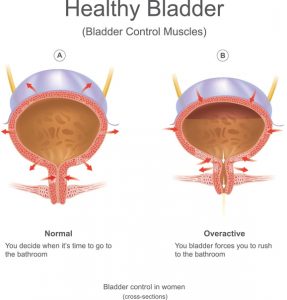 Even though incontinence is so widely experienced, it still remains a silent conversation – a lot of people are suffering from bladder leaks in silence. When ailments are not discussed openly, it leaves room for myths to travel from person to person. But many times, believing such myths could be causing you more harm than good.
Even though incontinence is so widely experienced, it still remains a silent conversation – a lot of people are suffering from bladder leaks in silence. When ailments are not discussed openly, it leaves room for myths to travel from person to person. But many times, believing such myths could be causing you more harm than good.
Here are eight common incontinence myths to stop believing so you can finally get relief from your bladder leaks.
8 Common Bladder Leak Myths to Stop Believing
- Everyone experiences incontinence the same: Every person is different, so how can every person with bladder leaks struggle the same way? There are two types of incontinence, stress and urgency. Stress incontinence occurs when there is pressure placed on the bladder, like when you cough or sneeze. Urge incontinence – or overactive bladder – is when a person experiences a sudden urgent need to urinate without any notice. Uncovering the type of urine loss can help you treat it better.
- Sanitary pads can be used to catch urine: Incontinence products are specifically designed for urine, meaning they can hold more and are more sanitary.
- Incontinence can only be treated with surgery: Some incontinence can be treated with surgery, but not all cases are the same. Especially among older patients, surgery is often used as a very last resort. Other treatments include lifestyle changes, behavioral treatments, pelvic exercises, exercise, and medication.
- Incontinence products are unhygienic: Finding the right product can help you feel fresh rather than wet. Try different brands to test out the best odor control and overall feeling.
- Childbirth causes a leaky bladder: Yes, women experience incontinence at higher rates than men, but not necessarily because they have given birth. Other factors like genetics, lifestyle, and age come into effect.
- Prostate surgery in men leads to leaks: Some men may experience urine leaks post prostate surgery with only 10 percent of men still experiencing leaks six months after surgery. Incontinence post-surgery is most commonly seen in men who had bladder leaks prior to surgery or who have a condition that contributes to bladder leaks.
- Reduce fluid intake for fewer leaks: Reducing your fluid intake can put you in harm’s way. When you run the risk of dehydration, it can lead to problems. Furthermore, less fluid in the bladder means you urinate less, which means harmful bacteria is not flushed out.
- When you need to pee, run to the bathroom: Running to the bathroom may seem like a natural reaction, but it isn’t advised. When you run, your pelvic muscles are relaxed, increasing your risk of leaking. Instead, stop, breathe deeply, and perform a strong Kegel contraction. This will buy you some time to walk to the bathroom.
Advertisement
Also read:
- Prevent bladder infection: Natural ways and lifestyle tips to boost bladder health
- Causes of irritable bladder: Symptoms, treatment, and home remedies
- Overactive bladder diet: Foods and drinks to manage bladder health
- Yoga poses to prevent bladder leaks
